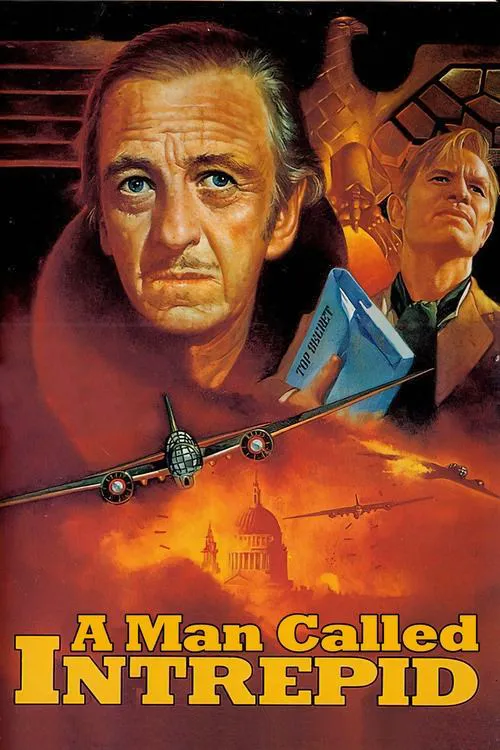A Man Called Intrepid

Plot
A Man Called Intrepid is a 1979 Canadian television film directed by Leslie H. Martinson, based on the book 'Intrepid's Last Statemenat' and the biography of Sir William Stephenson, codenamed 'Intrepid' by Winston Churchill himself. The film serves as a tribute to the unsung hero of Allied espionage during World War II. The movie opens in 1937 with the wealthy and charismatic Canadian businessman William Stephenson (Ray Milland), who makes a name for himself by successfully selling aircraft to the British government. Stephenson is aware of his country's vulnerability due to its geographical location and its limited contribution to the war effort. He recognizes the necessity for Canada to contribute more actively to the Allied cause. Stephenson decides to use his vast resources to covertly support the resistance efforts. As war breaks out in Europe, Stephenson's connections and influence continue to grow. He is an exceptional strategist, using his business acumen to establish a complex network of secret agents and informants. His clandestine efforts soon gain the attention of the British Secret Intelligence Service, and in particular, its Director, Desmond Morton (Donald Pleasence). Morton is impressed by Stephenson's resourcefulness and willingness to act, even when others are still hesitant. In his quest to establish an espionage network, Stephenson meets an American journalist, Virginia Vale (Madeleine Stowe), who becomes romantically involved with him. The couple embarks on a mission to Europe, using their connections to gather information and intelligence about German movements. During this time, Stephenson becomes increasingly influential in the inner workings of the British intelligence services. Meanwhile, a new director of British Intelligence, Admiral Godfrey (John Gielgud), has been placed in charge, and he recognizes the need for more aggressive action in Europe. Godfrey is willing to cooperate with Stephenson, who soon establishes a network of operatives that infiltrate high levels of Nazi Germany. The intricate web of espionage involves Stephenson's use of his business connections to move agents in and out of Europe. He relies on a combination of charm, guile, and his own personal bravery to navigate the labyrinthine world of espionage. Stephenson also manages to develop an extensive network of sources that include politicians, industrialists, and ordinary citizens. In addition to gathering information, Stephenson's network is involved in a series of daring sabotage operations. For instance, they successfully disable a shipment of aircraft destined for Germany, which allows the Allies an opportunity to strike back. Stephenson's espionage network grows to become an indispensable tool for the British government and Winston Churchill. The film suggests that Stephenson's efforts are instrumental in turning the tide of the war in favor of the Allies. The climax of the film revolves around a high-stakes encounter with a high-ranking German official, whose information is crucial to the success of the Allied war effort. Stephenson orchestrates a daring rescue operation, involving a team of his operatives to extract the official before it's too late. In the face of overwhelming resistance from the German authorities, Stephenson and his team manage to extricate the captive, who becomes an invaluable asset to the Allies. The film concludes with Stephenson returning to the United Kingdom as a celebrated figure. He is feted as a hero by Winston Churchill himself, who recognizes the crucial role Stephenson played in shaping the course of the war. The movie ends with the realization that despite his fame and recognition, Stephenson continues his work, albeit covertly. Overall, A Man Called Intrepid is a gripping tale of espionage, bravery, and cunning during one of the most pivotal moments in world history. The film celebrates the legacy of Sir William Stephenson, and highlights his pivotal role in the Allied war effort. It emphasizes the vital contribution of espionage and intelligence operations in turning the tide of the war, and ultimately, saving millions of lives.
Reviews
Recommendations


